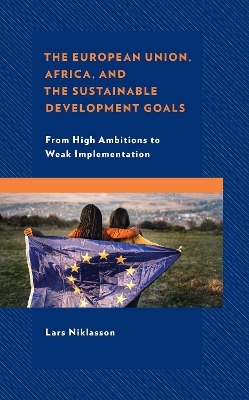
The European Union, Africa and the Sustainable Development Goals
From High Ambitions to Weak Implementation
Seiten
2024
Lexington Books/Fortress Academic (Verlag)
978-1-6669-5767-9 (ISBN)
Lexington Books/Fortress Academic (Verlag)
978-1-6669-5767-9 (ISBN)
The European Union is the world’s largest donor of developmental aid, with a strong interest in Africa and the Sustainable Development Goals. However, the high ambitions of the European policies are not matched by the strategies or activities to reach the desired goals.
The European Union has high ambitions in relation to Africa and in achieving the UN Sustainable Development Goals. One example is the new Africa Strategy, where the EU wants to have a strong partnership with the African Union. Other European policies contribute to the lofty objectives of the EU, which is the world’s largest donor of development aid.
The high ambitions are not matched by the implementation. The European policies, shaped by the Commission and the member states, are partly contradictory and hard to fulfill locally in Africa. Furthermore, they are focused on intentions rather than outcomes. The European policies need to be decentered to allow for the African context to play a larger role in the design and execution of policies.
The Sustainable Development Goals call for fundamental transformations, where political and economic development are of great importance to reach the social and environmental goals. This implies greater attention to the drivers and barriers for political and economic transformation in Africa. It also calls for a greater interest in the relationship between donors and recipients, to build trust and to find mutual gain. The EU needs to recognize that it is dependent on its African partners, while it simultaneously wants to influence and revise some of the African policies.
The European Union has high ambitions in relation to Africa and in achieving the UN Sustainable Development Goals. One example is the new Africa Strategy, where the EU wants to have a strong partnership with the African Union. Other European policies contribute to the lofty objectives of the EU, which is the world’s largest donor of development aid.
The high ambitions are not matched by the implementation. The European policies, shaped by the Commission and the member states, are partly contradictory and hard to fulfill locally in Africa. Furthermore, they are focused on intentions rather than outcomes. The European policies need to be decentered to allow for the African context to play a larger role in the design and execution of policies.
The Sustainable Development Goals call for fundamental transformations, where political and economic development are of great importance to reach the social and environmental goals. This implies greater attention to the drivers and barriers for political and economic transformation in Africa. It also calls for a greater interest in the relationship between donors and recipients, to build trust and to find mutual gain. The EU needs to recognize that it is dependent on its African partners, while it simultaneously wants to influence and revise some of the African policies.
Lars Niklasson is deputy professor (biträdande professor) of Political Science at Linköping University, Sweden.
| Erscheinungsdatum | 13.03.2024 |
|---|---|
| Sprache | englisch |
| Maße | 159 x 236 mm |
| Gewicht | 490 g |
| Themenwelt | Sozialwissenschaften ► Politik / Verwaltung ► Europäische / Internationale Politik |
| ISBN-10 | 1-6669-5767-4 / 1666957674 |
| ISBN-13 | 978-1-6669-5767-9 / 9781666957679 |
| Zustand | Neuware |
| Haben Sie eine Frage zum Produkt? |
Mehr entdecken
aus dem Bereich
aus dem Bereich
Studienbuch
Buch | Hardcover (2023)
De Gruyter Oldenbourg (Verlag)
CHF 62,90
erfolgreiche Interessenvertretung durch Prozesskompetenz im komplexen …
Buch | Hardcover (2023)
Wiley-VCH (Verlag)
CHF 58,75


